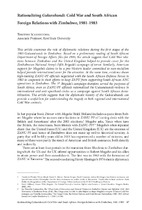Rationalizing gukurahundi: cold war and South African foreign relations with Zimbabwe, 1981-1983
Abstract
This article examines the role of diplomatic relations during the first stages of the
1983 Gukurahundi in Zimbabwe. Based on a preliminary reading of South African
Department of Foreign Affairs files for 1983, the article suggests that Cold War relations between Zimbabwe and the United Kingdom helped to provide cover for the Zimbabwean National Army’s Fifth Brigade’s campaign of terror. Similarly, American support for Mugabe’s claims to be a pro-Western leader committed to non-racialism helped provide international cover for the atrocities. At the same time, evidence shows high-ranking ZANU-PF officials negotiated with the South African Defense Forces in 1983 to cooperate in their efforts to keep ZAPU from supporting South African ANC operations in Zimbabwe. The 5th Brigade’s campaign therefore served the purposes of South Africa, even as ZANU-PF officials rationalized the Gukurahundi violence in international and anti-apartheid circles as a campaign against South African destabilization.
The article suggests that the diplomatic history of the Gukurahundi can provide a useful lens for understanding the tragedy in both regional and international Cold War contexts.

